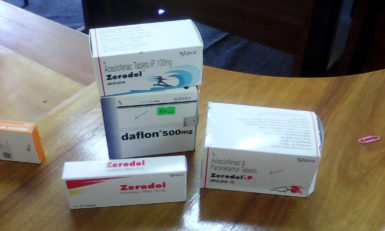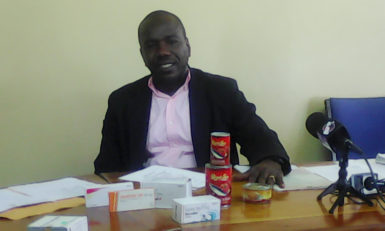Director of the Government Analyst Food and Drug Department (GA-FDD) Marlan Cole has said that some of the recent criticisms levelled against him and his department, reinforce and reassure him that he is performing his duties.
“The protection of public health is uppermost in my mind. Though business is not foremost in our minds, we facilitate 36% of the country’s GDP by licensing some of the country’s largest companies, such as Banks DIH and DDL, so we have to be committed to our mandate,” Cole said.
Speaking with reporters at a press conference at the GA-FDD Turkeyen office yesterday, Cole said that contrary to accusations made against him by sections of the media, he, as a public official, “performs duties without fear or favour and without being selective or biased.”
“I’m responsible, along with the members of my department, for the enforcement of the Food and Drug Act of 1971 and its accompanying legislation of 1977,” Cole said

Speaking to allegations made regarding the drug Zerodol, which claim that it is only certified for sale in India, his department is in possession of a dossier which specifies otherwise.
“Zerodol which is an anti-inflammatory has an official registrant which is Pharmagen Enterprises and Ansa McAl,” he explained, while adding that his department is the first line of defence in making sure that drugs on the local market are safe and efficacious.
For each drug registered by the GA-FDD, according to Cole, a dossier is provided to the department.
“This dossier tells us all the details, including how to verify the active pharmaceutical ingredient as well as all clinical trials the drug would’ve been part of,” he said, before adding that the department is not allowing other companies to import drugs which are similar to those already on the market because of regulations which prohibit parallel trading.
“When an importer secures the dossier on a particular drug from the manufacturer or exporting country that is an expensive undertaking.

We have no provisions in the law for parallel trading and once a company has registered a drug, they are the sole distributer of that drug to the local market. They obtain a marketing authorization which is issued to one person.
If there is anything wrong with the drug, complaints will be levelled against the authorized distributor,” Cole explained.
He also addressed concerns raised about a consignment of Royal Sea brand sardines which has been left on the wharf for lack of simple information.
According to Cole, the information missing from the product was the name and address of the manufacturing company, which is a clear violation of Regulation 18 of the Food and Drug Act.
“When importing food, we ask for a free sale certificate.
The document provided for this product, when examined, raised several concerns.
Several features were missing and there were some discrepancies,” he said, while explaining that a subsequent decision by the department to examine the product showed that the labelling did not comply with legal requirements.
“The Act and Regulations guide the response to such a product. It is in violation. The inspectors therefore informed the director that it should not be released for sale on our local market and I have officially informed… customs as to their findings,” Cole stressed.
He further explained that subsequent to this decision, his department received communication, purportedly from ABD Khan Company Limited of Thailand, in which that company claimed to be the manufacturer of the product.
“An investigation however showed that ABD Khan manufactures the King Bell brand of sardines and not the Royal Sea brand, which is the [one] we have refused entry to,” Cole clarified.
Asked to identify the local importer who is attempting to import the product, Cole said that as the investigation is ongoing he did not wish to do so.




